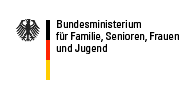Gender
Definition of "Gender"
While German only has one word, “Geschlecht”, meaning both “sex” and “gender”, English distinguishes between biological sex and social gender. “Gender” is therefore meant not biologically, but in all the wide diversity of its social contexts. Consequently, Gender is also affected by origin, faith, age, physical capacity or disability, sexual orientation and other structural factors. Gender roles and gender identity are thus socially learned and culturally constructed. Gender also describes men and women in their social relationships with each other and among themselves. It thus involves hierarchies and discrimination. Gender is subject to historical and cultural change. It is therefore open for change and shaping. Women and men are traditionally assigned to different and unequal social positions because of their sex assignment. They are stereotyped as typical “women” and “men” and perceived accordingly. The actual diversity found in the real world stands in direct opposition to this. Gender equality therefore means breaking the restraints imposed by traditionally assigned positions and giving both women and men opportunities for giving their lives individual shape.
A few aspects of “Gender”
You can find more information under Gender knowledge
A few aspects of “Gender”
- Human beings are born with biological characteristics which are situated along a spectrum of characteristics between male and female. Human beings are assigned to two categories at birth on the basis of these characteristics, either as “boys” or as “girls”. This determination of biological sex, to a certain extent arbitrary, is also, in most societies, the basis for social behaviour. Gender-specific socialisation follows on from biological definition. The human being is “made” into a girl / woman or a boy / man in a complex process of rearing involving social norms and stereotypes, self-identification, images and traditions, and by means of practices and institutions. Gender is thus “socially constructed”. So the term “Gender” emphasises the fact that sex and gender are not so much a natural as a social phenomenon. This also means that our ideas of “masculinity” and “femininity” are constantly shifting. The sex-and-gender system has traditionally been associated with a hierarchical (or “patriarchal”) idea of the superiority of the man. Today, however, the idea is increasingly coming to the fore that such ideas of dominance are no longer tenable. In order to respect changes, including those involving people’s life decisions, it is necessary to allow human beings to lead the lives they wish, as freely as possible from the assignment as girls or boys. This means departing from the notion that there are “natural roles” for men or for women. It also means ensuring at social and legal levels that the sex of a human being does not have a decisive effect on her or his life.
- Gender focuses on the fact that being a Woman and being a Man are not equal categories standing side by side and of equal value. Sex is not only an individual characteristic, but is also at the same time a structural category integrated into hierarchical and discriminatory social and structural gender relations. This means that the removal of discrimination and the demolition of gender stereotypes must be undertaken on many levels and with various means. Existing discrimination must be corrected in part using compensatory measures (e.g. by the promotion of women). In addition, causes of the present gender relations must be analysed so that they can be changed (e.g. thinking through the impact on gender relations as part of planning processes). There must also be incentives for those who wish to extricate themselves from problematical role models (e.g. by means of parenting leave models). Dealing with Gender must be as diverse as Gender itself.
- Gender relations are closely interwoven with categories of social diversity such as age, sexual orientation, ethnicity, class and individual ability or disability, and are determined in part by them. Gender therefore means the sex-and-gender system in all the diversity of these social characteristics. It is necessary to observe concrete situations precisely and to think in terms of complexity.
You can find more information under Gender knowledge
erstellt von Administrator
—
zuletzt verändert:
02.01.2010 20:07





